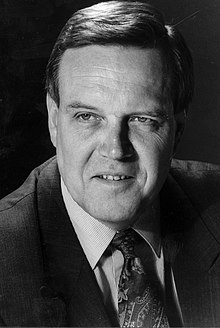German politician
- ↑ Hyde-Price, Adrian (2000). Germany & The European Union: Enlarging NATO and the EU. Manchester University Press. p. 149. ISBN 0719054273.
- ↑ Members of the Commission Euro-Atlantic Security Initiative (EASI), Carnegie Endowment for International Peace.
- ↑ William Tuohy (23 August 1989), Kohl Names New Party Aide Amid Flap Over Campaign Tactics Los Angeles Times .
- ↑ Craig R. Whitney (5 November 1992), Berliners Await the Return of a Capital. And Wait. New York Times .
- ↑ The Schleswig-Holstein Question Wall Street Journal , 28 February 2000.
- ↑ Volker Rühe, Germany’s next foreign minister? The Economist , 20 August 1998.
- ↑ Tyler Marshall (16 October 1993), A Death in Cambodia, an Uproar in Germany Los Angeles Times .
- ↑ Carl Schoettler (23 July 1992), German chancellor wins vote supporting Adriatic force to monitor embargo Baltimore Sun .
- ↑ Tyler Marshall (16 October 1993), A Death in Cambodia, an Uproar in Germany Los Angeles Times .
- ↑ Germany Begins Cutbacks Under Weapons Treaty Los Angeles Times , 4 August 1992.
- ↑ A new pilot? The Economist , 19 June 1997.
- ↑ Craig R. Whitney (4 February 1993), Germans Cancel Big U.S. Purchase New York Times .
- ↑ Alan Cowell (16 December 1997), First, Army Neo-Nazis, Now Racists on Internet Worry Germany New York Times .
- ↑ Roger Cohen (18 March 2000), A Political Newcomer Breaks Rules in Germany New York Times .
- ↑ Jeffrey Gedmin (15 October 2004), National interest is behind Germany's UN bid Financial Times .
- ↑ Ralf Neukirch (16 September 2010), Germany Renews Campaign for UN Security Council Seat Der Spiegel .
- ↑ Benjamin Bidder (20 March 2014), Ex-Verteidigungsminister Rühe: "Putin hat versagt" Der Spiegel .
- ↑ Jan Techau (17 June 2014), Germany’s Budding Defense Debate Carnegie Endowment for International Peace .
- ↑ Andreas Förster (9 May 2012), Gazprom: Putin und seine Komplizen Frankfurter Rundschau .
- ↑ Mathew D. Rose (7 May 2005), Unternehmensbeiräte Geschacher hinter der Mauer des Schweigens Spiegel Online .
- ↑ Board International Crisis Group.
- ↑ Task Force on Cooperation in Greater Europe European Leadership Network (ELN).
- ↑ Board of Trustees Atlantik-Brücke.
- ↑ Stephen Kinzer (2 September 1992), German Unrest Expected to Bring Tightening of Law on Immigration New York Times .
- ↑ John Schmid (7 March 2000), 2 Kohl Party Contenders Have Strong Ties to Ex-Communist Region: German Politics Opens Up to the East New York Times .
- ↑ Christoph von Marschall Mathias Müller von Blumencron (10 February 2019), Ex-Verteidigungsminister Volker Rühe: "Guttenberg hat die Bundeswehr zerstört" Der Tagesspiegel .
- ↑ Stephan Detjen (4 November 2018), "Merz eröffnet der CDU wesentlich bessere Wahlchancen" Deutschlandfunk .
- ↑ 4 Moving Up: Key German Leaders of the Postwar Generation Los Angeles Times , 8 May 1985.
- ↑ Sonni Efron (23 January 1995), Chechen War Drives Wedge Between Russia, Germany Los Angeles Times .
- ↑ Chechens say they downed 2 jets; Moscow denies claim CNN , 23 October 1999.
- ↑ Valdai Conference: Russia's identity and values The Economist , 20 September 2013.
- ↑ Urgently Wanted: A Protocol to Keep Russia and the West From Slipping Into War Newsweek , 10 October 2015.
- ↑ Robin Emmott (26 August 2015), Russia, NATO need new rules to cut risk of war, ex-ministers say Reuters .
- ↑ Christoph von Marschall Mathias Müller von Blumencron (10 February 2019), Ex-Verteidigungsminister Volker Rühe: "Guttenberg hat die Bundeswehr zerstört" Der Tagesspiegel .
Wikimedia Commons has media related to Volker Rühe .
Volker Rühe | |
|---|---|
 | |
| Federal Minister of Defence | |
| In office 1 April 1992 –26 October 1998 |
| Political offices | ||
|---|---|---|
| Preceded by | Federal Minister of Defence (Germany) 1992 – 1998 | Succeeded by |
| International | |
|---|---|
| National | |
| People | |
| Other | |